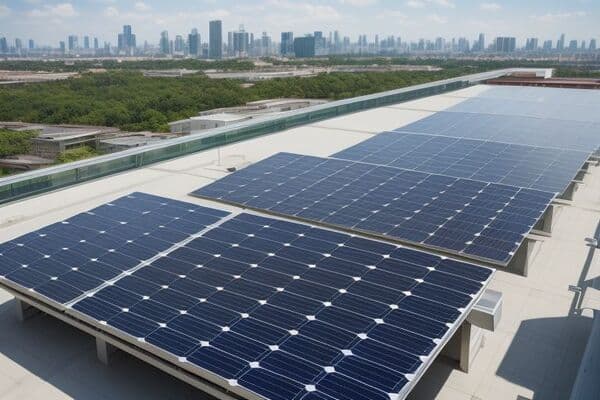Optimizing Solar Energy for Healthcare: Challenges and Solutions in India

Abstract
Explore the untapped potential of solar energy in Indian healthcare with a focus on challenges and innovative solutions. Drawing from a hospital's experience, discover the setbacks faced with solar water heaters and the superiority of solar electricity generators, particularly in regions with hard bore water. Delve into the economic and sustainable benefits of transitioning to solar electricity, backed by a robust infrastructure of large hospital roofs. Mitigation measures for water hardness in solar water heaters are explored, providing practical insights for effective maintenance. Uncover the path forward, as hospitals can optimize solar energy, ensuring a reliable and sustainable power supply for the future.Introduction
India, a sun-drenched tropical nation with over 300 days of sunshine annually, is yet to fully harness the potential of solar energy within its healthcare sector. Despite the abundance of sunlight, solar energy adoption faces skepticism in the Indian market, primarily due to concerns about high upfront costs and doubts regarding its efficacy. This skepticism is exacerbated by the prevalence of outdated technology.
Reflecting on our hospital's experience, an investment in a solar water heater eight years ago resulted in disappointing outcomes. The project appeared to be a miscalculation, lacking a comprehensive understanding of the underlying concepts. This blog explores the diverse applications of solar energy, focusing on the challenges faced by hospitals in India, particularly concerning water hardness and the shortcomings of outdated technology.
Solar Energy Applications in Healthcare
Solar Water Heaters: An Initial Setback
While solar water heaters present a relatively cost-effective solution for hospital implementation, the issue of water hardness poses a significant challenge. If not properly addressed, water hardness can lead to calcium deposition, resulting in erosion and rapid deterioration of the solar plant. Consequently, the seemingly economical choice may not yield optimal results.
Solar Electricity: A Robust Solution
Conversely, harnessing solar energy for electricity, although involving higher costs and maintenance compared to solar water heaters, proves to be a more robust solution. This is especially true in regions with hard bore water. Hospitals relying on bore water without optimizing it for solar water heaters may find transitioning to a solar energy-to-electrical energy generator to be a prudent and forward-thinking choice for sustainable and reliable power generation.
Solar Electricity Generator: A Prudent Investment
Despite higher initial investments, a solar electricity generator offers better results for hospitals. The need for electricity in hospitals extends beyond water heating, and the demand for hot water may decrease in the summer. However, electricity bills typically rise due to increased air conditioner usage. Therefore, the solar electricity generator emerges as a better choice for hospitals requiring a continuous electricity supply, especially in states where power outages are more common during the summer, depending on hydroelectric projects for power generation.
Infrastructure Advantage: Large Roofs
Hospitals typically possess large roofs that can accommodate a significant number of solar panels. The generated electricity can be stored in batteries and used later. Some state governments even permit the selling of excess energy to state electricity boards, contributing to the revenue of hospitals.
Mitigation and Maintenance for Solar Water Heaters
To address the impact of hard water on solar water heaters, several measures can be taken:
1. Water Softening
Installing a water softener for the water supply to the solar water heater is recommended if hard water is a significant issue. Water softeners remove or reduce calcium and magnesium ions in the water, minimizing scale formation.
2. Regular Maintenance
Periodic inspections and cleaning of the solar collector and other components can help prevent and remove scale deposits. This may involve flushing the system or using descaling agents to dissolve existing scale.
3. Water Quality Testing
Regular testing of water quality can help identify any changes in mineral content, allowing for timely maintenance to prevent or address scale formation.
4. Anti-Scaling Devices
Some solar water heater systems may incorporate anti-scaling devices or coatings on collector surfaces to reduce the formation of scale.
5. Use of Distilled Water
In extreme cases, using distilled or softened water for the solar water heater system can be considered to minimize mineral deposits.
Conclusion
In conclusion, the healthcare sector in India has an immense opportunity to leverage solar energy for sustainable and reliable power generation. While solar water heaters present challenges, particularly regarding water hardness, transitioning to solar electricity generators proves to be a more robust and forward-thinking solution. With proper mitigation and maintenance measures, hospitals can overcome the hurdles posed by hard water, ensuring the effective and long-term utilization of solar energy in healthcare facilities across India.
This Unlock the Future of Healthcare Management! 🚀🏥🌟
Is managing your hospital, clinic, or lab becoming a daunting task? Experience the ease and efficiency of our cutting-edge Management Software through a personalized demo.
